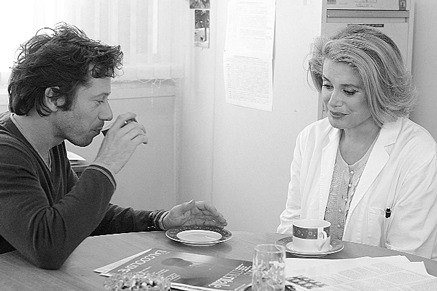Arnaud Desplechin’s two-track tale of a woman, ex-husband is masterful
If “Seinfeld” was a show about nothing, Arnaud Desplechin’s films are about everything. Seizing a subject like acting or the end of the cold war, he wrings as much as he can out of it. “My Sex Life… or How I Got Into an Argument” was seemingly inspired by the stereotype that French cinema consists entirely of Parisian intellectuals talking about their love lives.
Desplechin created a three-hour epic about a philosophy student’s struggle to finish his thesis, complete with enough voice-over to knock a screenwriting teacher dead. The result was pretty impressive, enough so that it probably discouraged other filmmakers from covering the same ground. In “Kings and Queen,” Desplechin delves into melodrama and explodes the genre.
Full of sharp mood changes, “Kings and Queen” suggests that he can do almost anything he wants and succeed in putting his personal stamp on it.
Nora (Emmanuelle Devos) manages an art gallery in Paris and takes care of her 10-year-old son. When the film begins, she’s about to marry a wealthy businessman, who will be her third husband. However, her father (Maurice Garrel) falls sick. Initially plagued by an ulcer, he discovers that he has colon cancer and only has about a week to live.
The story of Nora’s ex-husband Ismael (Mathieu Amalric) takes place simultaneously. When we first see Ismael, he’s listening to hip-hop, eating a hamburger and ignoring his answering machine. A viola player riddled with debt to the French tax authorities, he’s institutionalized against his will for 10 days. Ismael and Nora’s paths only cross twice, but “Kings and Queen” juxtaposes their lives throughout.
Above all else, “Kings and Queen” is a masterful piece of storytelling. Unlike the middlebrow films of Merchant-Ivory and other popular art house directors, it has a genuinely literary touch––and not just because it refers to Greek mythology, Yeats (who inspires a dream of Ismael’s) and Apollinaire. Desplechin’s best and strangest film, “Esther Kahn,” is his only period piece and full-fledged literary adaptation. Not since Desplechin’s 54-minute debut, “The Life of the Dead,” has he made a film shorter than two hours, and his work’s length—in this case, 150 minutes—is central to its impact.
Watching “Kings and Queen” is like getting lost in a good novel. Desplechin has the chuztpah to juggle chronology daringly––staging multiple flashbacks within a hallucinatory reverie––and pull it off without confusing the spectator.
Nora’s story is a tragedy, while Ismael’s is a comedy. The former feels morose, dominated by the prospect of oncoming death and scored with sweeping orchestral muzak. The latter takes its cues from Ismael’s manic tendencies. Some of the subjects it broaches––his lawyer’s drug addiction, long-term backstabbing by a member of his string quartet, armed robbery––could be sentimental material in the wrong hands, but the film treats them with a light touch, playing a holdup at the deli owned by Ismael’s father for goofy laughs. Even within each story, moods change frequently. There’s a real unpredictability and flow, as one’s sympathies with Nora and Ismael constantly shift in response to their behavior.
“Kings and Queen” is weakest in the few occasions when it relies on genre tropes, like the Tarantino-esque robbery, and strongest when it feels closest to lived experience.
Paul Thomas Anderson’s “Magnolia” is the sole American film “Kings and Queen” brings to mind, and the comparison is more flattering to Desplechin. For all the emotional power of “Magnolia,” it’s more bombastic and far less original, drawn more from cinema than reality. Paradoxically, “Kings and Queen” feels both full of artifice––wrapped in a quasi-documentary format, with Nora addressing the camera directly––and more believable than most films that purport to be realistic. The lighting and cinematography are subtly stylized, lending many scenes a golden glow or dark-blue tone without calling attention to themselves.
However, “Kings and Queen” is an easier film to admire than to passionately embrace. Along with its literary flavor, Desplechin’s sensibility tends to be emotionally detached. Maybe it’s a hedge against going full force into melodrama, a means to maintain some critical distance.
Structurally, “Kings and Queen” is a bit odd, going on for 40 minutes after a scene that would be any other film’s emotional climax. The final scene is obviously intended to make a similar impact, but Ismael’s sudden eloquence and tenderness makes him sound like Desplechin’s mouthpiece.
The film’s uniqueness may stem from such offbeat rhythms and pacing, but its chill saps its effectiveness. A triumph in many respects, its craft outweighs its heart.
gaycitynews.com



































